
President Lai Commemorates Victory in Europe, Makes No Mention of R.O.C. Resistance Against Japanese Aggression
United Daily News Editorial, May 7, 2025
According to Reuters, President Lai Ching-te held a commemorative event in honor of Victory in Europe Day (VE Day) at the Taipei Guest House, where he hosted foreign dignitaries and delivered a speech declaring that "aggressors will always be defeated." This marks the first time Taiwan has commemorated VE Day—a novel move. However, the timing and content of the event raise eyebrows. At the end of WWII in Europe, fierce battles in Asia were still ongoing, with Taiwanese still fighting as "Japanese soldiers" in the South Pacific. President Lai is commemorating the end of the wrong war in the wrong region at the wrong time.
May 8, 1945, was the day Nazi Germany announced unconditional surrender in Berlin, marking the end of the Second World War in Europe—exactly 80 years ago. Since the surrender came into effect at midnight on May 9 Central European Time, Western European countries commemorate VE Day on May 8, while Russia and Eastern European nations mark it on May 9. President Vladimir Putin of Russia, citing this anniversary, recently proposed a three-day ceasefire in the war in Ukraine. Chinese President Xi Jinping also took the occasion to visit Moscow and attend Putin’s military parade in Red Square.
Perhaps in response to Xi’s presence in Moscow, President Lai deliberately chose the same day to deliver his speech, as a form of counterbalance. Yet from the perspective of Taiwan’s own historical context, this reactive posture only reveals President Lai’s immaturity and belligerent misunderstanding of history.
Though the war in Europe ended on May 8, the war in Asia continued under Japan’s brutal campaign until Emperor Hirohito’s unconditional surrender on August 15. The two endpoints are over three months apart. In other words, President Lai rushes to commemorate the "end of WWII" while ignoring that, at that very moment, Japanese forces were still waging bloody warfare across Asia. Taiwan at the time was Japan’s colonial military base, and many Taiwanese were conscripted to fight in Japanese uniforms in Southeast Asia. Has President Lai forgotten—or never known—this historical reality?
If President Lai’s aim is to build ties with European nations through this VE Day commemoration, that in itself isn’t objectionable. The problem lies in how Taiwan has abandoned its own historical milestones. The Republic of China no longer observes the victory in the war against Japan on September 3; and “Taiwan Retrocession Day” on October 25 was scrapped as a national holiday under President Chen Shui-bian—an attempt to erase the historical memory of younger generations. Today, how many youths know that Taiwan’s retrocession occurred when Governor-General Andō Rikichi signed surrender documents to R.O.C. Chief Delegate Chen Yi at the Taipei Public Auditorium (now Zhongshan Hall), formally ending five decades of Japanese occupation?
By ignoring Taiwan’s own historical relevance and instead latching onto VE Day, President Lai risks looking out of place rather than earning respect. The Democratic Progressive Party (DPP) often criticizes Communist China for monopolizing the WWII victory narrative to legitimize its rule. But the root cause is that the DPP itself rejects the name “Republic of China,” repeatedly trying to separate Taiwan’s identity from it. Over time, this has blurred and marginalized the Republic of China’s role in the Allied victory, leaving the historical narrative wide open for Beijing to dominate.
President Lai’s attempt to highlight the “inevitable defeat of aggressors” through VE Day may be well-intentioned, but from the perspective of Taiwan and Asia, it overlooks the central role of the R.O.C. as a victor in the Asian theater. To European nations, such a shallow message is unlikely to resonate. More crucially, President Lai refuses to genuinely acknowledge the Republic of China’s bitter eight-year war of resistance against Japan on the mainland or the pain of Taiwan’s colonial past. Instead, he tries to gloss over history with simplistic slogans. As a result, he discards both the legacy of R.O.C. victory and the honor of Taiwan’s liberation. In commemorating the wrong war, President Lai shows not courage—but the heroism of an ostrich burying its head in the sand.